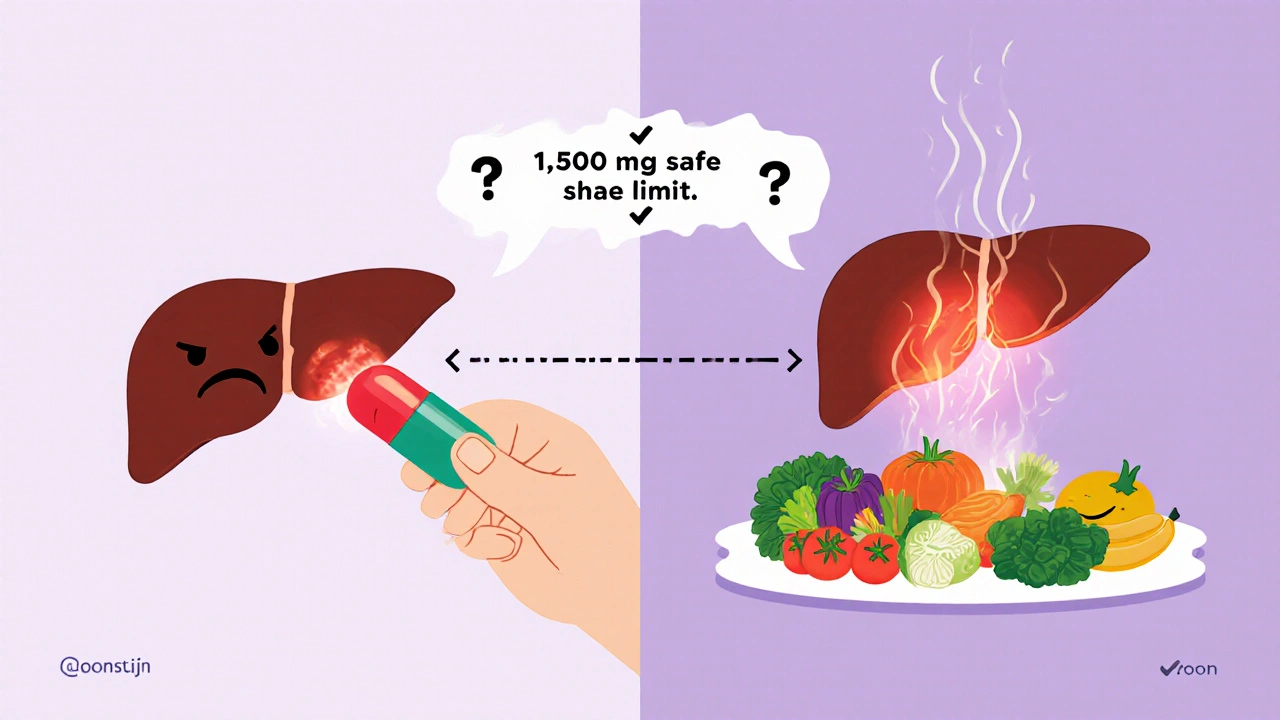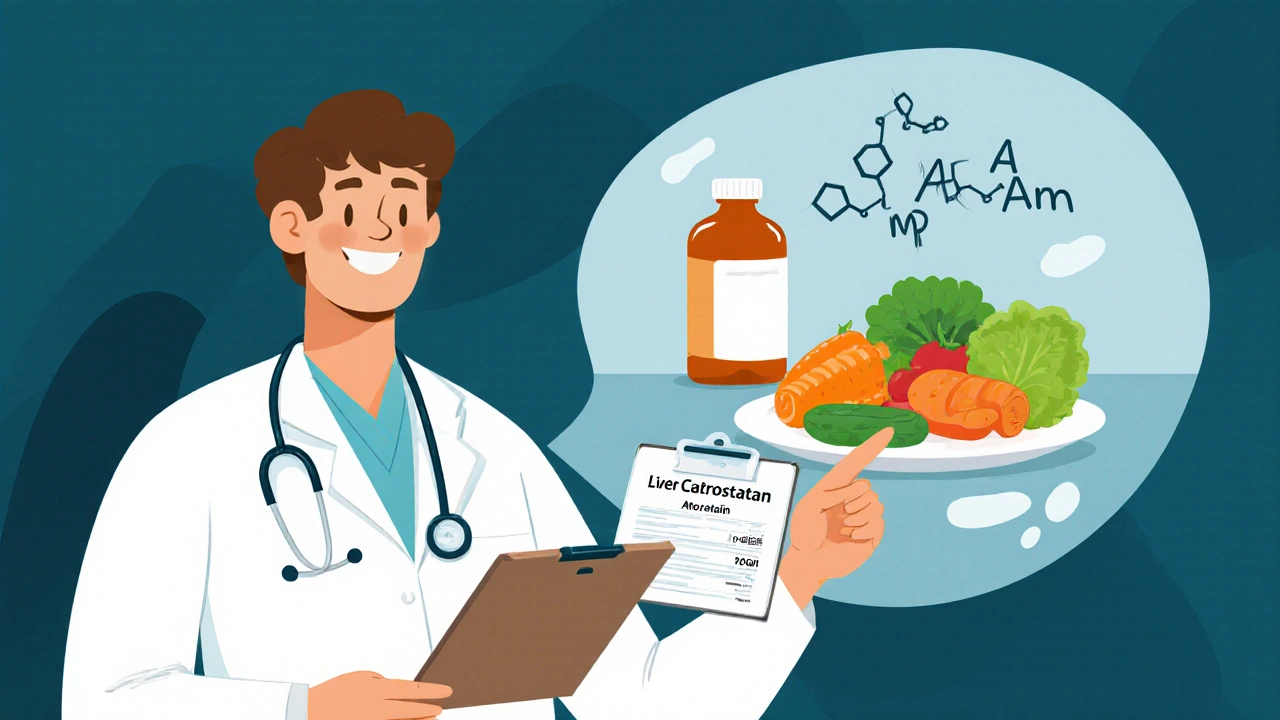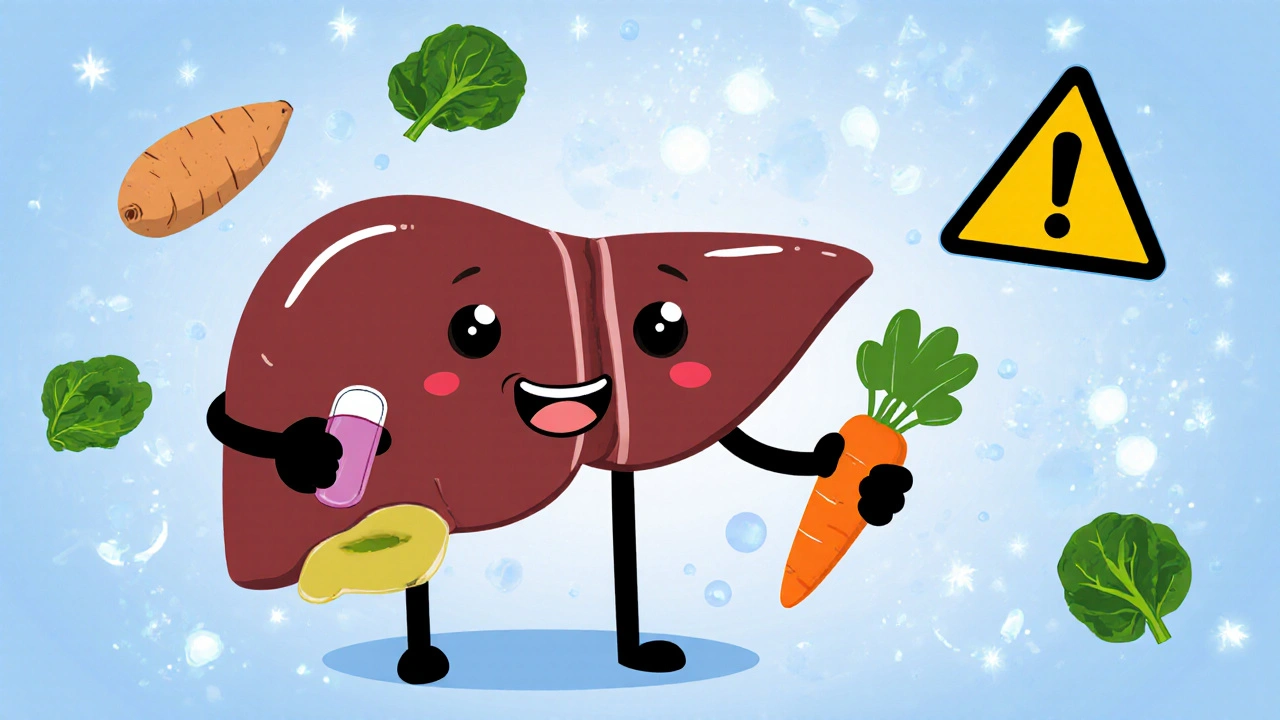If you're taking atorvastatin for high cholesterol and thinking about adding vitamin A supplements, you're not alone. Many people try to boost their health with vitamins while managing prescription meds. But here’s the real question: atorvastatin and vitamin A-do they play nice together? The short answer is yes, mostly. But there are important details you need to know before popping that pill.
What Atorvastatin Actually Does
Atorvastatin is a statin drug, prescribed to lower LDL (bad) cholesterol and raise HDL (good) cholesterol. It works by blocking an enzyme in your liver called HMG-CoA reductase. That enzyme is what your body uses to make cholesterol. When it’s slowed down, your liver pulls more cholesterol out of your blood. That’s why your doctor likely prescribed it-to reduce your risk of heart attack or stroke.
People take atorvastatin daily, often for years. It’s not a quick fix. You won’t feel different after taking it. But your blood tests will show changes over time. Common doses range from 10 mg to 80 mg. Most people start at 10 or 20 mg. Side effects are usually mild: muscle aches, digestive upset, or headaches. Serious muscle damage (rhabdomyolysis) is rare but possible, especially if you’re also taking other medications that affect the liver.
Vitamin A: More Than Just a Cold Fighter
Vitamin A isn’t just for preventing night blindness or boosting immunity. It’s essential for skin health, cell growth, and vision. You get it from foods like liver, sweet potatoes, carrots, spinach, and dairy. Most people don’t need supplements because they get enough from diet.
But some folks take vitamin A supplements anyway-thinking it’ll improve skin, fight aging, or support immune function. The problem? Vitamin A is fat-soluble. That means your body stores it. Unlike vitamin C, which gets flushed out, excess vitamin A builds up in your liver. Too much can cause toxicity. Symptoms include dizziness, nausea, blurred vision, bone pain, and liver damage.
The safe upper limit for adults is 3,000 mcg (10,000 IU) per day. Most supplements contain 1,500-5,000 mcg. If you’re eating liver regularly or taking multiple supplements, you might already be over that limit.
Do Atorvastatin and Vitamin A Interact?
There’s no direct chemical reaction between atorvastatin and vitamin A. They don’t cancel each other out or create a dangerous compound. That’s good news.
But here’s the catch: both are processed by your liver. Atorvastatin is broken down by enzymes called CYP3A4. Vitamin A doesn’t use that exact pathway, but high levels of vitamin A can stress your liver. If your liver is already working hard to metabolize atorvastatin, adding a heavy supplement burden could increase the chance of liver enzyme changes.
A 2023 study in the Journal of Clinical Lipidology followed 1,200 patients on statins who also took vitamin A supplements. About 12% showed mild elevations in liver enzymes (ALT and AST). None had symptoms. All enzyme levels returned to normal when they stopped the supplement. No cases of liver injury were reported.
So, no alarm bells-but it’s not a free pass either.

Who Should Be Extra Careful?
Not everyone needs to avoid vitamin A with atorvastatin. But certain people should talk to their doctor before combining them:
- You drink alcohol regularly-even one drink a day can raise liver stress
- You already have fatty liver disease or elevated liver enzymes
- You take other medications that affect the liver (like certain antibiotics, antifungals, or seizure drugs)
- You’re over 65-liver function slows with age
- You’re taking more than one supplement with vitamin A (multivitamins + eye formula + skin booster)
If you fall into any of these groups, your doctor might suggest checking your liver enzymes every 3-6 months instead of once a year.
What About Beta-Carotene?
You might hear that beta-carotene (the plant form of vitamin A) is safer. That’s true. Your body only turns beta-carotene into vitamin A as needed. It doesn’t store excess like preformed vitamin A (retinol).
If you’re worried about liver strain, swap your retinol supplement for a beta-carotene one. You’ll still get the benefits for skin and vision without the buildup risk. Foods like carrots, kale, and squash are packed with beta-carotene and won’t overload your system.
One exception: smokers. High-dose beta-carotene supplements (over 20 mg/day) have been linked to increased lung cancer risk in smokers. If you smoke, avoid high-dose beta-carotene supplements altogether.
How to Take Them Safely
If you and your doctor agree it’s okay to take both, here’s how to do it right:
- Get a baseline liver test before starting vitamin A
- Stick to 1,500 mcg or less of preformed vitamin A per day
- Avoid supplements with more than 5,000 IU unless prescribed
- Take vitamin A with food-it’s better absorbed and less likely to cause stomach upset
- Don’t take it at the same time as atorvastatin. Space them out by at least 2 hours
- Watch for signs of liver stress: dark urine, yellowing skin, persistent nausea, unusual fatigue
Most people who follow these steps have no issues. But if you notice anything unusual, stop the supplement and call your doctor.

Alternatives to Vitamin A Supplements
You don’t need a pill to get the benefits of vitamin A. Real food is safer, cheaper, and more effective.
- One medium sweet potato: 1,400 mcg of vitamin A
- Half a cup of cooked spinach: 570 mcg
- One large egg: 75 mcg
- One cup of milk: 150 mcg
- Three ounces of beef liver: 6,500 mcg (don’t eat this more than once a week)
Try adding more colorful vegetables to your meals. Orange, red, and dark green veggies are your best friends. You’ll get vitamin A, fiber, antioxidants, and none of the liver stress.
What Your Doctor Will Ask
If you bring up vitamin A with your doctor while on atorvastatin, they’ll likely ask:
- What brand and dose of vitamin A are you taking?
- Do you eat liver or other organ meats?
- Are you taking other supplements or multivitamins?
- Have you noticed any changes in energy, appetite, or skin color?
- Do you drink alcohol?
Be honest. Many people don’t think of their multivitamin as a "supplement"-but it might contain 1,000 mcg of vitamin A already. That’s half your daily limit.
Bottom Line: It’s Usually Fine-But Don’t Guess
There’s no reason to panic if you’re taking atorvastatin and a low-dose vitamin A supplement. Most people won’t have a problem. But that doesn’t mean it’s risk-free. The liver doesn’t shout when it’s under pressure. It just quietly starts to struggle.
If you’re healthy, eat well, and take 1,500 mcg or less of vitamin A, you’re likely fine. If you’re unsure, skip the supplement. Get your vitamin A from food. It’s safer, more natural, and just as effective.
Atorvastatin is one of the most studied drugs in history. Vitamin A has been around for over a century. But combining them? That’s where personal health matters more than general advice. Talk to your doctor. Get tested. Listen to your body. That’s the real way to stay healthy.
Can I take vitamin A with atorvastatin?
Yes, most people can. There’s no direct interaction between atorvastatin and vitamin A. But both are processed by the liver, so high doses of vitamin A could increase liver stress. Stick to 1,500 mcg or less per day and avoid supplements with more than 5,000 IU unless prescribed.
Does vitamin A affect cholesterol levels?
No, vitamin A doesn’t directly lower or raise cholesterol. Atorvastatin works by blocking cholesterol production in the liver. Vitamin A supports cell function and vision but doesn’t interfere with that process. Don’t take it as a substitute for your statin.
Is beta-carotene safer than vitamin A supplements?
Yes. Beta-carotene is the plant-based form of vitamin A. Your body converts it only as needed, so it doesn’t build up like preformed vitamin A. It’s a safer choice for most people. Avoid high-dose beta-carotene if you smoke.
How do I know if vitamin A is hurting my liver?
You usually won’t feel it. Early signs include fatigue, loss of appetite, or mild nausea. More serious signs are yellowing skin or eyes, dark urine, or persistent pain under your right ribs. The best way to know? Get a liver function test every 6-12 months if you’re taking supplements with atorvastatin.
Should I stop vitamin A if I’m on atorvastatin?
Not necessarily. If you’re taking a low dose and have no liver issues, you can continue. But if you’re unsure, skip the supplement and get vitamin A from food instead. Sweet potatoes, spinach, and carrots are excellent sources with zero risk of overdose.


Comments (11)
Sherri Naslund
November 20, 2025 AT 01:04i mean honestly why are we even talking about this like who even takes vitamin a supplements anymore? i just eat carrots and call it a day. my skin looks better and my liver isn't screaming at me. also why do people think supplements are magic? they're just fancy food pills.
Ashley Miller
November 20, 2025 AT 05:51lol of course they "don't interact"... until the pharmaceutical-industrial complex decides they do. remember when they said aspartame was safe? and then it wasn't? and then it was again? the liver doesn't shout... it just quietly dies while the FDA approves another "safe" combo. #vaccineforliver
Martin Rodrigue
November 21, 2025 AT 14:03The pharmacokinetic interaction between atorvastatin and preformed vitamin A is not clinically significant in the majority of patients. However, concurrent hepatic metabolism via phase I enzymes may theoretically increase the risk of transaminase elevation, particularly in individuals with pre-existing hepatic compromise. I would recommend monitoring liver enzymes at baseline and at 3 months if supplementation is initiated.
Freddy Lopez
November 22, 2025 AT 17:43It's interesting how we treat medicine like a puzzle where every pill has to fit just right. But the body isn't a machine-it's a living system. Maybe the real question isn't whether vitamin A and atorvastatin interact, but why we feel the need to add anything at all. Food has been doing this job for millennia.
Brad Samuels
November 23, 2025 AT 01:09I've been on atorvastatin for 7 years and took a 2000 IU vitamin A supplement for my skin. Never had an issue. But I also eat sweet potatoes every week, drink water, and sleep 7 hours. Maybe the real hero isn't the pill-it's the lifestyle. Just saying.
Mary Follero
November 24, 2025 AT 10:00I work as a dietitian and I see so many people popping vitamin A because they saw a TikTok ad. The truth? You don't need it. Eat a rainbow. Carrots, spinach, red peppers, eggs-your body knows what to do with real food. Supplements are for when you can't eat well, not when you're just lazy. And yes, spacing them 2 hours apart from your statin is smart. Small habits make big differences.
Will Phillips
November 25, 2025 AT 09:12They told you it was safe but they lied. The liver doesn't scream it just shuts down and you wake up one day with jaundice and a bill for a transplant. And who benefits? The supplement companies. The pharma giants. The doctors who get kickbacks. You think they care if you live or die? No. They care about the quarterly profit report. Don't be a lab rat.
Arun Mohan
November 26, 2025 AT 05:03Look, I'm from Mumbai and here we eat turmeric with ghee and call it medicine. Vitamin A? Pfft. You think your Western pills are advanced? My grandma ate liver once a month and lived to 98. You overthink everything. Just eat food. Stop buying bottles of chemicals. Your ancestors didn't need your multivitamin.
Tyrone Luton
November 28, 2025 AT 02:38It's not about the interaction. It's about the narrative. We've been conditioned to believe that every deficiency needs a pill. That every organ needs a booster. But what if the real problem isn't low vitamin A? What if it's the industrial food system? The stress? The sleep deprivation? The fact that we've outsourced health to a pill bottle? The supplement industry doesn't want you to ask that.
Jeff Moeller
November 28, 2025 AT 17:29Eat the carrot not the capsule
Herbert Scheffknecht
November 29, 2025 AT 19:36You know what's wild? We spend billions researching how drugs interact with vitamins, but we never ask why we're taking the drug in the first place. Why is cholesterol high? Is it the sugar? The stress? The lack of movement? The fact that we sit 10 hours a day? We treat symptoms like they're the disease. Atorvastatin isn't the fix-it's a bandaid on a broken system. And vitamin A? That's just another bandaid. We need to fix the foundation. Not just stack more pills on top.